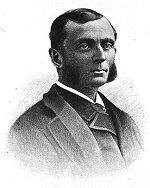
George Miller Beard
(Montville, Connecticut: May 8th, 1839 – New York City: January 23rd, 1883)
George Beard was an American neurologist.

(Montville, Connecticut: May 8th, 1839 – New York City: January 23rd, 1883)
George Beard was an American neurologist.

From the preface:
The following narratives and analyses of facts relating to the investigation of important and interesting phenomena of the nervous system are published in the belief that they will be new, in whole or in part, to the majority of neurologists and practitioners, both in Europe and America.
Some of the facts connected with the detailed history of muscle-reading are here put on permanent record for the first time, and have been obtained partly from memory and partly from public and private documents in my possession.
It is interesting and incredible that these phenomena...
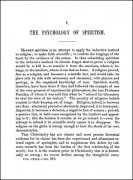
This article approaches spiritism from a scientific point of view including neurology and psychology. Beard's intention was to point out the failures of spiritualists and their lack of scientific understanding. He did this by criticizing how supporting evidence was gathered, mainly through testimony of human beings. However, Beard understood that the senses cannot always be trusted and that expert knowledge is crucial in deducing, explaining, and understanding the situation.
As the oracle gave place to the astrologer, the astrologer to the alchemist, the alchemist to the witch, the witch...
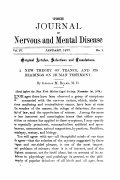
Beard distinguished several varieties of trance:
Trance may, for the sake of convenience of description, be divided into four varieties: the spontaneous, the self-induced, the emotional, and the intellectual trance.He goes on to describe how these various forms of trance can be entered and he explains that the emotions through which trance is most likely to be excited, are fear, reverence, wonder, and expectation. He rejects the notion that trance is created by some force or fluid the operator emits and rather explains it as the brain is only partially awake and active while the other...
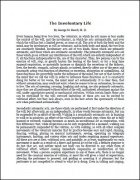
The 'involuntary life' would today be described as trance or as a hypnotic state. Beard writes:
Every human being lives two lives, the voluntary, in which he acts more or less under the control of the will, and the involuntary, in which he acts automatically, and over which the will has but a limited power, or none at all. The acts of both the body and the mind, may be involuntary as will as voluntary, and in both body and mind, the two lives are constantly blended.
However, he was a skeptic when it came to the popular practices and explanations of these phenomena by the means of animal...
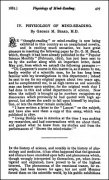
The type of 'mind-reading' George Beard means here is what we today call muscle-reading, which is a term that Beard himself coined. Beard describes several experiments he conducted and describes very clearly the physiology of muscle-reading, and that it is an involuntary muscle contraction that has nothing to do with animal magnetism or thought transference.
1st edition 1877; PDF 10 pages.